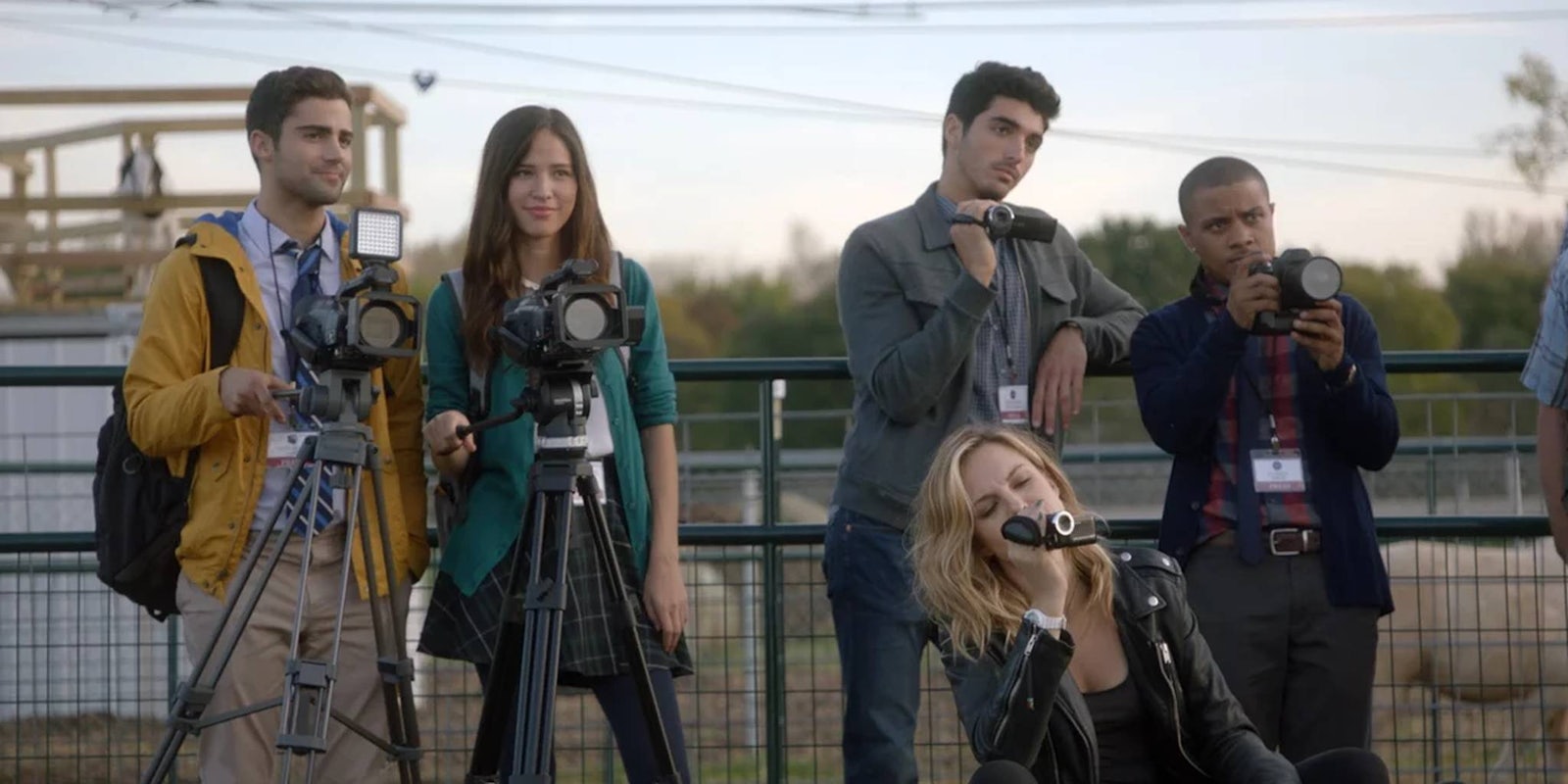In the new go90 original series Embeds, a group of reporters stumble around Iowa with their smartphones and cameras at the ready, trying to capture a good soundbite or potential viral moment. Their home is a bus, and their job is to stay focused enough to cover every angle of a presidential candidate.
Scott Conroy, series executive producer and co-creator, has some real-life experience on that front: He covered Mitt Romney and Sarah Palin’s 2008 presidential campaigns for CBS. That’s where he met series co-creator Peter Hamby—currently head of Snapchat News—who was working for CNN at the time. They wrote the pilot script in 2012, but it would be four more years before the series was shot—amid the 2016 election.
Embeds, shot mostly in Iowa over the course of a month, wasn’t shaped by the election, however.
“We created a separate universe in which the show exists,” Conroy tells the Daily Dot. “We didn’t want to parody Donald Trump, for instance. In a sense, how do you parody a parody?”
Embeds‘ fictitious Republican candidate, John Dobson, holds an eight-person rally and incites a chant of “corn.” He wears dad jeans. Dobson sounds pretty delightful in contrast with the candidates of the 2016 election and the neverending stream of surreal moments and gaffes. Megyn Kelly is also an executive producer, and while she’d never been an embed herself, she did give Conroy some insight into life at Fox News: “The people who know the most about what’s going on at Fox are the hair and makeup people… and there’s a similar dynamic on the campaign trail.”
Embeds tries to find a gender dynamic. In the first episode, Marissa (Kelsey Asbille) is cornered and hit on by an older reporter, though she later asserts herself and calls him out. New embed Syd (Chloe Brooks) is sized up by the suspicious group with internet measurements: “She has 200,000 Twitter followers but she’s only following four people.” Noah (Taylor Zakhar) is already preparing to bed her, and in the pilot we discover he’s slept with Dobson’s sex-positive daughter, Claire (Alexis G. Zall), though he never really sees any professional fallout from it.
In television and film, the role of the female journalist is often tied to who she’s sleeping with (House of Cards, the Gilmore Girls reboot). In Embeds, Marissa refreshingly gets a scoop without any real entanglements, though the show does focus a bit more on romantic endeavors than the ins and outs of political journalism, or the high comedy of D.C. (like Veep). Conroy relates that female writers and producers brought their own perspective to the show. “I went into it very aware of the problems that have existed,” he says.
The series is also aware of its smartphone-embedded audience: An older reporter (Charles Stransky in, really, the best role) zings Marissa and her “special snowflakes generation.” At a college party, a guy apologizes to Quinn (Max Ehrich) by saying, “I’m sorry I triggered you.” A Bon Iver track is used as a pickup line. Noah quotes Hunter S. Thompson and this becomes a running joke, but Fear and Loathing on the Campaign Trail ’72 this is not.
https://www.youtube.com/watch?v=KM6CFhDNn8s
“There’s a lot of debate about millennials and whether they’re too self-obsessed and whether they are too sensitive sometimes,” Conroy says. “The protagonists of our show are young people in the workplace and doing something that is making a difference in the world. They’re not the millennials you often see sitting around figuring out what they want in an adult world.”
Later episodes tackle the responsibilities of journalists, and resonate a bit more in this terrifying new media landscape. “It speaks to the importance of having real reporters on the ground, even if they’re young, even if they’re inexperienced,” Conroy says. “They come from a different perspective than people who have been inside the Beltway for 40 years. Those are the people that had no idea that Trump was coming… I think it was the young reporters on the ground that didn’t have those preconceived notions of the way that this was supposed to shake out.”
Though Embeds is its own “separate universe,” it does open up a conversation about how journalists should and can proceed.
“I don’t think journalists can approach covering the Trump administration like he’s a normal president, because he’s not,” he says. “So if that means taking a more overtly antagonistic approach to doing their jobs, then that’s what needs to be done. We in the media have to be more vigilant than we’ve ever been before.”


